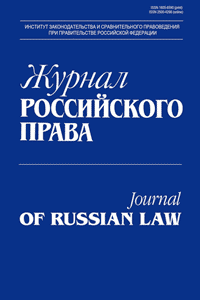The article reveals general criteria for evaluating expert’s opinion, in particular, expert’s participation at the end of the preliminary investigation (inquiry) and during drafting of the indictment (crime bill), interaction between the investigator and the expert in identification and remedy of causes and conditions that facilitated the commission of the crime. The article considers two different methods of assessing expert’s opinion: the internal, which is confined to logical analysis of the opinion, understanding consistency of the scientific and technical means and methods of the research, applied by the expert, the nature of the identified features and their role in justification of the drawn conclusions; and the external, that assesses the opinion in the legal, procedural respect, and observance of the rights of the participants in a criminal case, as well as in relation to all criminal case files. Expert’s participation at the end of the preliminary investigation (inquiry) and during drafting of the indictment (crime bill) comes down to advice about the performed examinations, determination of the place and importance of the expert’s opinion in the totality of the available evidence collected for the criminal case. The interaction between the investigator and the expert in remedy of causes and conditions that facilitated the commission of the crime in penitentiary system of Russia is regarded as a daily routine in penal crimes’ investigation and a remedial measure with the purpose of prevention such crimes in future. As part of the study the author analyzed 60 files of criminal investigation on penalty crimes in various regions of Russia. The author highlights peculiarities and suggests conclusions after considering case studies on the issue. The research methodology involves the use of such techniques as analysis, synthesis, induction, interviewing and others.
Forensic examination, internal and external evaluation, completion of a preliminary investigation (inquiry).
1. Veshchestvennye dokazatel´stva: informatsionnye tekhnologii protsessual´nogo dokazyvaniya / pod obshch. red. V. Ya. Koldina. M., 2002.
2. Vzaimodeystvie sledovatelya i eksperta-kriminalista pri proizvodstve sledstvennykh deystviy: ucheb. posobie / pod red. I. N. Kozhevnikova. M., 1995.
3. Vinberg A. I., Malakhovskaya N. T. Sudebnaya ekspertologiya. Volgograd, 1979.
4. Deyatel´nost´ ekspertno-kriminalisticheskikh podrazdeleniy organov vnutrennikh del po primeneniyu ekspertno-kriminalisticheskikh metodov i sredstv v raskrytii i rassledovanii prestupleniy: ucheb. posobie / pod red. V. A. Snetkova. M., 1996.
5. Dozorov N. T., Zinin A. M., Statkus V. F. i dr. Vzaimodeystvie sledovatelya so spetsialistom ekspertno-kriminalisticheskikh podrazdeleniy pri proizvodstve rassledovaniya: ucheb. posobie. M., 1988.
6. Zinin A. M., Maylis N. P. Sudebnaya ekspertiza: uchebnik. M., 2002.
7. Ishchenko P. P. Spetsialist v sledstvennykh deystviyakh (Ugolovno-protsessual´nye i kriminalisticheskie aspekty). M., 1990.
8. Koltunin V. V. i dr. Sudebnye ekspertizy. M., 2001.
9. Makhov V. N. Uchastie spetsialistov v sledstvennykh deystviyakh. M., 1974.
10. Plotkin D. M., Ishchenko E. P. Noveyshie metody issledovaniya veshchestvennykh dokazatel´stv v kriminalistike: nauch.-prakt. posobie. Ryazan´, 2005.
11. Rossinskaya E. R. Sudebnaya ekspertiza v grazhdanskom, arbitrazhnom, administrativnom i ugolovnom protsesse. M., 2005.
12. Rukovodstvo dlya sledovateley / pod red V. V. Mozyakova. M., 2005.
13. Spravochnaya kniga kriminalista / pod red. N. A. Selivanova. M., 2001.
14. Tkachenko N. I., Epifanov S. S., Lyadov E. V. Pravovye i organizatsionnye aspekty primeneniya spetsial´nykh, kriminalisticheskikh tekhnicheskikh sredstv i metodov v raskrytii, rassledovanii i preduprezhdenii pobegov iz mest lisheniya svobody: monografiya. Ryazan´, 2011.








